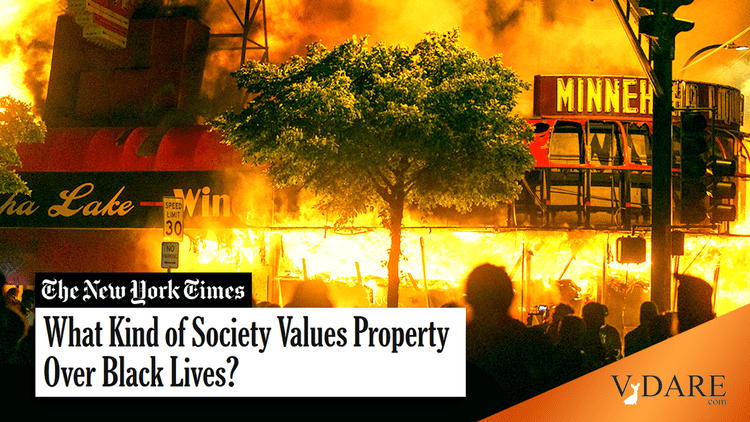


By Steve Sailer
06/18/2020
From the NYT Opinion section, instructions on how not to Badthink about looting:
What Kind of Society Values Property Over Black Lives?
The hackneyed emphasis on “Why loot?” obscures the question, which black people have asked for centuries.
Robin D. G. Kelley is a professor of American history at U.C.L.A. and the author of “Freedom Dreams: The Black Radical Imagination.”
June 18, 2020
“Why are they looting?”
It’s asked every time protests against police violence erupt into civil unrest.
We know the answers by now: Poverty, anger, age, rage and a sense of helplessness. …
Let me offer a more productive question instead: What is the effect of obsessing over looting?
Why do you keep noticing all the looting? If your mind was pure of racist thoughts, you wouldn’t even notice the looting. But it’s not, is it? You have racist thoughts! CONFESS.
It deflects from the core problem that brought people to the streets: The police keep killing us with impunity. Instead, once the burning and looting start, the media often shifts to the futility of “violence” as a legitimate path to justice. Crime becomes the story. Riots, we are told, cause harm by foreclosing constructive solutions. But such rebellions have not only shined a spotlight on American racism; they have also spawned investigations and limited reforms when traditional appeals have failed.
… Rarely do we read about the white people who looted during the Watts rebellion in 1965 and in Detroit in 1967. Indeed, white people, among them far-right provocateurs, have engaged in looting and destruction of property during the current protests; there is ample video evidence from across the country. There are also videos of black organizers asking them to stop because the police will “blame that on us.”
Our country was built on looting — the looting of Indigenous lands and African labor. African-Americans, in fact, have much more experience being looted than looting. The long history of “race riots” in America — in Cincinnati; Philadelphia; Detroit; New York; Memphis; Wilmington, N.C.; Atlanta; New Orleans; Springfield, Ill.; East St. Louis; Chicago; and Tulsa, Okla. — more closely resembled anti-black pogroms than ghetto rebellions. White mobs, often backed by the police, not only looted and burned black homes and businesses but also maimed and killed black people.
Tulsa was only 98 years ago, people. How many more recent events can you name? Let me see, there was FDR’s redlining and Emmett Till and … nope, that’s about it. Tulsa is the third most recent important thing ever to happen in America. Therefore, it must have caused whatever bad things blacks are doing now.
Our bodies were loot. The forced extraction of our labor was loot. A system of governance that suppressed our wages, relieved us of property and excluded black people from equal schools and public accommodations is a form of looting. We can speak of the looting of black property through redlining, slum clearance and more recently predatory lending.
Police departments and municipal courts engage in their own form of looting by issuing and collecting excessive fines and fees from vulnerable communities. A 2017 report by the U.S. Commission on Civil Rights found that “municipalities that rely heavily on revenue from fines and fees have a higher than average percentage of African-American and Latino populations.” And cities rely on tax revenues not only to fund the police but also to pay the ballooning costs to settle police misconduct cases. Chicago shelled out more than $100 million to settle police misconduct suits in 2018 alone.
I found it ironic that the New York Stock Exchange went silent for 8 minutes 46 seconds during George Floyd’s funeral, even though Wall Street has profited from police misconduct. Cities and counties sometimes have to issue bonds to pay out these settlements; banks collect fees for their services and investors earn interest. Some of the beneficiaries of this arrangement include Wells Fargo, Goldman Sachs and Bank of America, as well as smaller regional banks.
The hackneyed emphasis on “why loot?” obscures the critical question black people have been asking for centuries: What kind of society values property over black life? Should the theft of sneakers and computers, or shattered windows, graffiti or broken locks become our obsession when black people are being killed before our eyes, when the police are bashing the heads of protesters and tear-gassing people during a viral pandemic that can cause respiratory illness? …
And much more of this ilk …